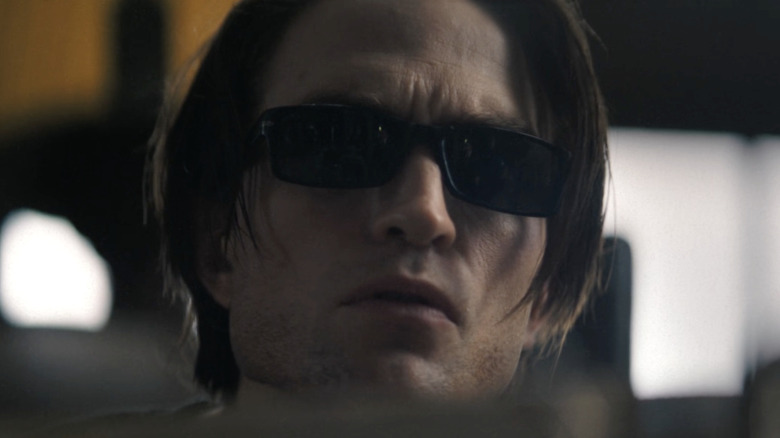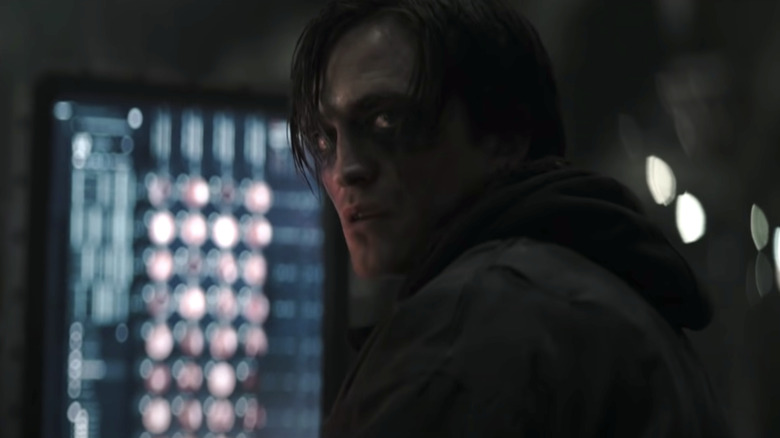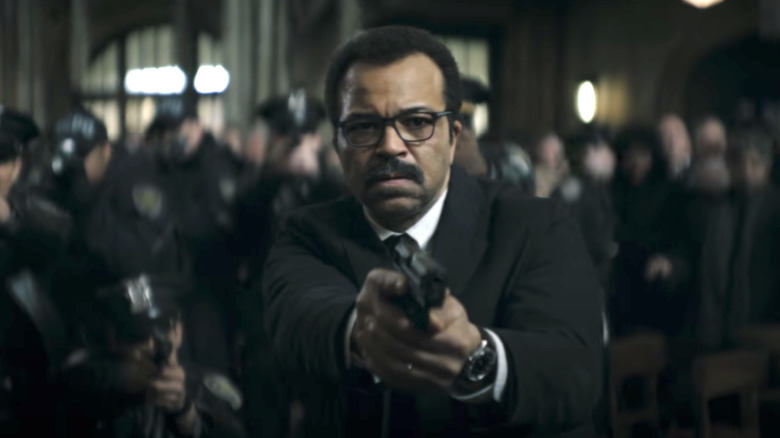Batman's Drastic Change In The Batman Explained
Warning: this article contains spoilers for "The Batman."
In the new movie "The Batman," directed by Matt Reeves and starring Robert Pattinson as the "Caped Crusader," fans of the classic DC character are introduced to a new version of Bruce Wayne. The film opens with a brutal murder, revealing that there is a new serial killer on the rampage in Gotham City, aiming to stop all the lies of the corrupt public officials. Meanwhile, a thriving illegal business circulating drugs called "Drops" is run by Carmine Falcone (John Turturro) and Oswald Cobblepot (Colin Farrell), a.k.a. the Penguin, and Bruce is caught in the middle of it all, trying to help save his city and the people in it.
While a lot of the characters in the movie are very familiar to fans, with Selina Kyle (Zoë Kravitz), a.k.a. Catwoman, James Gordon (Jeffrey Wright), and Alfred Pennyworth (Andy Serkis) just a few other recognizable names in the movie, there are also some striking changes in "The Batman" compared to other screen adaptations of the superhero's story. Previously, new iterations of Batman have caused intense debate over costume changes and acting performances, but in this case, the biggest change comes in the form of Batman's goals and everyday behavior. In "The Batman," Bruce truly takes on the role of detective, looking closely at all of the clues laid out by the Riddler (Paul Dano) in order to catch him.
Bruce Wayne embraces his detective side the most in this film
In "The Batman," the defining difference between this version of Bruce Wayne and any other we've seen on the big screen is that Pattinson's Batman is more detective-like than ever before. Although he's still a vigilante who uses technology and his fists to beat up the expected criminals on the street, he also understands that careful observation and investigation can get him far, especially when it comes to the Riddler.
Dano's Riddler is the main antagonist of the film, and he is introduced through the murder of Mayor Don Mitchell Jr. (Rupert Penry-Jones). Bruce shows up alongside the police officers and detectives of Gotham City to the crime scene, called there by Gordon. While one main reason Gordon calls him there is likely the letter addressed "to the Batman" left by the body, it's probably also due to Bruce's talent in taking notice of the details and tracking down criminals. For example, Bruce quickly takes note of a key piece of evidence nearby: the blood spatter on the ground from the carpeting tool Riddler uses as the murder weapon. At this point, it looks like the investigative team hasn't even spotted it yet themselves, as a crime scene photographer notes his actions and photographs the blood after Bruce moves away.
Bruce brings Gordon along early on to the mayor's car, where he find's the usb drive that the Riddler left containing evidence of his shady dealings at the club. He also finds the note in the Riddler's apartment hidden in the bat cage all on his own. Overall, Bruce clearly understands the value of intelligence and patience, particularly getting into the detective mindset as he tracks down the Riddler, who challenges him through the constant riddles as clues. Seriously, Bruce is surprisingly skilled at riddles, showcasing Reeves' decision to emphasize Bruce's mental strength alongside his physical capabilities.
Batman and James Gordon are active partners in investigating the Riddler
Although Bruce spends a lot of "The Batman" fighting criminals on the street, he is actively investigating the crimes of the Riddler, Cobblepot, Falcone, and the corrupt officials Riddler brings to light. In this investigation, Gordon is arguably his right hand man, and the police detective clearly respects Bruce's abilities and drive for justice. At one point in the film, he even says that Bruce is the only one he trusts, representing his unwavering loyalty to the vigilante whose real identity he doesn't even know.
The two connect through the bat signal when Bruce needs to go out and fight criminals on a particularly rough night, but also when they have some important information to share with one another. Usually, Bruce provides Gordon with all the new information he finds — though he kind of jumps the gun in the case of the Riddler, even enacting an undercover scheme with Selina at the club without telling Gordon, likely because it's more personal than other cases.
Gordon in "The Batman" is not too different from other iterations of the character in that he values truth and justice over violence and vengeance — though there does seem to be some leeway for him here, as he looks the other way a bit, allowing Batman to rough up some criminals here and there. But all in all, it's Bruce's just nature that convinces Gordon to keep working with him on cases, and considering he literally brings the vigilante to a crime scene, he clearly values Bruce's detective abilities.


